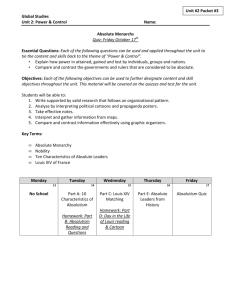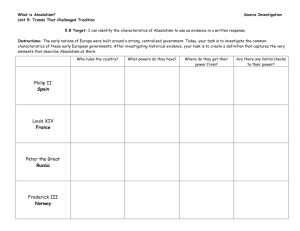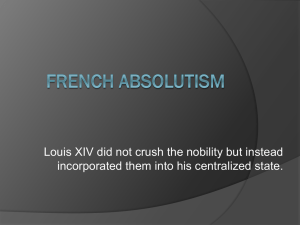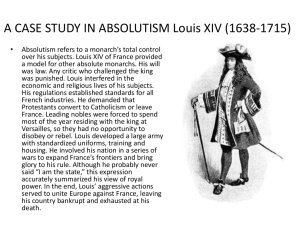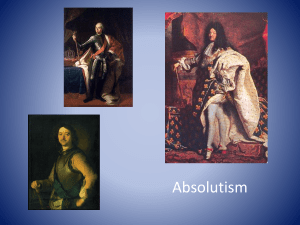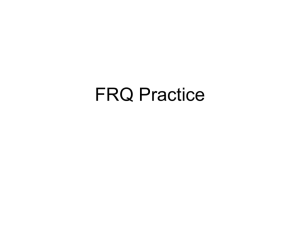Section 4.21
advertisement
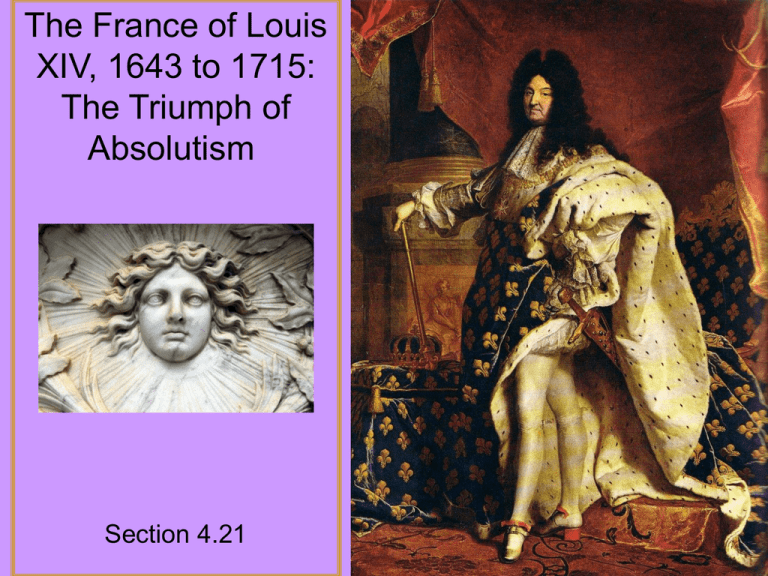
The France of Louis XIV, 1643 to 1715: The Triumph of Absolutism Section 4.21 Rise of Western Absolutism Henry IV 1589 Stuart Reign Begins 1598 1604 1629 Sun King’s Reign Begins 1643 1649 Peace of Alais Edict of Nantes Fronde Treaty of Utrecht 1715 Absolutism • • Defined: Monarchy posses exclusive sovereign power over the State – Sovereignty- a monopoly over the instruments of power • Executive, Judicial, legislative – L’etat, c’est moi” (the state is myself)- Louis XIV Characteristics – Rule by Divine Right of Kings • the king is the earthly representative of God – Bureaucracies • utilized to enforce monarch’s will • Made up of Nobles of the Robe – Nobility effectively brought under control • Eastern Europe nobility became more powerful – Large Standing Army • Uniformed, disciplined, professional under monarchs control – Royal power was absolute but not arbitrary – Not Totalitarianism • Lacked ability to enforce total regulation of art, culture, etc. • Similar to totalitarianism in emphasis on being submissive to the State, use of armies and war to distract population – More a legal principle than a fact in Europe Theory of Absolutism • Jean Bodin (1530-1596) – Wrote Les Six livres de la République during French civil wars of 1500s – Believed only absolutism could bring stability to country – Said that monarch can not be subject to outside force (nobility) – But said monarch is subject to reason • Bishop Jacques Bossuet (1627-1704) – Created principle of divine right of kings – King placed on throne by god • Thomas Hobbes (1588-1679) – Leviathan – Pessimistic view of man in a state of nature • “Nasty, brutish, and short” – Everyone seeks power, gain – Advocated an Enlightened Despotism – Rejected “divine right” – Purely secular reasons for absolutism French Civilization in the Seventeenth Century • France – 19 million people (1700) • 3X England, 2X Spain – 90% engage in agrarian economic life • Good, fertile soil for agriculture – Uneven distribution of wealth • millions lived in poverty, large number were also wealthy • more merchants in France than GB or Neth (but smaller proportion) The Development of Absolutism in France • • Estates General – 1st Estate- Clergy – 2nd Estate- Nobility – 3rd Estate- Everyone Else – not met since 1615 Parlements (NOTE the spelling) – 12 judicial bodies – largely hereditary members, (noblesse de robe ) – unlike the English Parliament – not legislative bodies, – Courts of law with each being the supreme court for a certain area – Had duty to record royal edicts& laws – wouldn’t enforce royal edicts they deemed unconstitutional – Parlement de Paris Henry IV • Henry of Navarre (Bourbon) • Laid foundation fro French absolutism • Duke of Sully – Henry’s chief economic adviser • • • • • Promised a “chicken in every pot” “Paris is well worth a mass” Edict of Nantes Lowered taxes Paulette – Annual fee paid to retain hereditary rights • Revived trade – Granted trade monopolies – Rebuild roads, canals Cardinal Richelieu (1585-1642) • Governments of Marie de Medici and her son Louis XIII (1610-1643) administered by Cardinal Richelieu Cardinal but really a politique who fortified absolutism and French cultural hegemony during the 16001700s Continued Henry IV’s policies of centralization Presided over royal council Intendants • • • • – • • • • Used nobles of robe to collect taxes, etc. Advances mercantilism Encouraged nobility to develop interests in commerce without loss of title or status Encouraged merchants with grants of titles of nobility Developed “commercial companies” Peace of Alais • Prohibits private warfare and orders the destruction of fortified castles not used by the king • Peace of Alais (1629) – amends the Edict of Nantes after Protestant uprising is put down – Huguenots can not share political power, can not keep private armies – Huguenots can practice Protestantism • Path toward absolutism solidified Cardinal Richelieu at the Siege of La Rochelle. French Civilization in the Seventeenth Century • Salons • develop by upper class women • gathering of stimulating people of quality under the roof of an inspiring hostess or host • partly to amuse one another and partly to refine their taste and increase their knowledge through conversation and readings • Debate without restraint of an academy • Contributed to the spread of French ideas Salon Life Salon Life The Fronde (1648-1653) • A Rev led by the parlements and nobility – Demanded the right to declare certain edicts unconstitutional – Nobility called for Estates General • Hoped to dominate the bourgeoisie and clergy Cardinal Mazarin The Fronde (1648-1653) • if nobles won France would have been like Poland, Russia – Frondeurs offered no systemic plan for reform; just a power grab • After close call with the nobility the bourgeoisie stayed closer to the King and accepted absolutism • • • • • Louis XIV takes the reins of power (1661) Marzarin died in 1661 (14th is 18 years old) ability to see and stick to policy, extremely methodical, worked hard loved himself, flattery Lavish and opulent displays “every inch and at every minute a King.” Development of the “state” • A sovereign state possesses a monopoly of justice and use of force not private persons or private armies (feudal) • He claimed a monopoly over law and army – Private persons neither pass legal judgments or control private armies Absolutism • • L’etat, c’est moi” (the state is myself) Divine Right of Kings-the king is the earthly representative of God\ • Theory developed by Bishop Bossuet – the king is accountable to God and therefore will do what is right and conform to the higher authority of God • Royal power was absolute but not arbitrary and must be reasonable and just like the will of God but free from dictation from parlements, estates – More a legal principle than a fact in Europe • Kings had to deal with advisers, bureaucrats, local customs, lawyers, ecclesiastics, nobles, grandees, hereditary officeholders, and miscellaneous dignitaries • Slow passage of information required some element of local control Government and Administration • Inherited bureaucracy (Richielieu) – – – – – – Intendants From Nobles of the Robe (not Sword) Administered 1 of 32 generalities Reported directly to king Never worked in home region Collected taxes, recruited soldiers, administered justice • Army centralized – – – – – – – – All armed men only fought for him Put the artillery into the army Systematized the ranks and grades Defined the chain of command (Louis XIV at the top) Discipline and order become the rule of the day Housed troops in barracks Army could be used to suppress rebellion at home Size created new bureaucratic demands • increased army from 100, 000 to 400, 000 The Splendor of Versailles • • • located about 10 miles from Paris monument to worldly splendor (Hall of Mirrors, gardens, chandeliers) Developed complex system of behaviors – Lever, diner, coucher (rising, eating, going to bed) – Six different entries of person at the lever (rising) – Noblemen a specified moment held the right sleeve of the king’s nightshirt – Induced great nobles to live a Versailles Economic and Financial Policies: Colbert • • • Ability of raise adequate mulla is chronicle problem Taxation – Tradition of not taxing the nobles so only the unprivileged classes (peasants) paid taxes – Louis didn’t want to give up control to nobles (so he didn’t tax them) – Wealthy middle class also bought their way out of taxes (bought a title) Tax Farmer – Collected taxes, paid government and kept the extra! Louis Le Nain (French, 1603-1648) Peasant Interior with an Old Flute Player c. 1642 Economic and Financial Policies: Colbert • Where does Louis get money? –Raise taxes (not effective) –Devalued currency (inflation) –Sold titles (limited number of candidates) –Sold government offices (corruption) –Sold military commissions (dangerous) –Annul town charters and sell liberties back to the cities (dangerous) Reforms by Colbert • • Mercantilist policies Expanded export of French goods and increased wealth from which government income could increase – • • • • Especially in textiles Reduced internal tariffs – Great Five Farms promoted free trade Commercial code (uniform laws of trade over local customs) Built Roads and canals Raised tariffs – Imported NO foreign finished goods Reforms by Colbert • Required uniform standards of manufacture (Quality Control) – More foreigners would trust buying French goods • Subsidized development of certain manufactures – Silk, glassware, tapestries, woolens • Founded colonies • French East India Company • Supplying large army drove much manufacturing • Result is government works to restrict nobility at the same time it is protecting privileges of nobility Religion: The Revocation of the Edict of Nantes, 1685 • • • • • • • Control over French Church Believed that religious unity necessary for strength of his rule Repressed Janenism (type of Calvinism in Catholic Church) Pressure to re-Catholicize Huguenots increased Dragooning (mounted infantrymen) were quartered in Huguenot homes In 1685 he revoked the Edict of Nantes Persecution of Huguenots drives them out of France – Went to Holland, Germany and America – Loss of Huguenots is social blow to France Revocation of the Edict of Nantes Religion: The Revocation of the Edict of Nantes, 1685 Accomplishments of Louis XIV • • Reforms are partial but legitimate Strain of war causes discontent with populace
